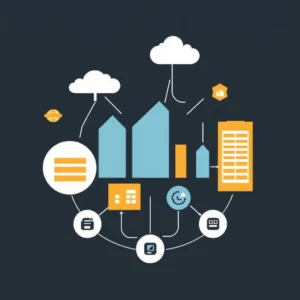Generative AI Boosts Business Productivity: What Companies Need to Know

Generative AI is rapidly transforming the business landscape, ushering in a new era of productivity, innovation, and competitive advantage. As organizations across industries adopt this technology, leaders are discovering both its vast potential and the practical considerations required to harness its benefits. Here’s what companies need to know about how generative AI is driving productivity and shaping the future of work.
What Is Generative AI and Why Does It Matter?
Generative AI refers to artificial intelligence systems that can create new content—text, images, audio, code, and more—by learning patterns from vast datasets. Unlike earlier AI, which focused on analyzing and classifying data, generative AI can produce original outputs that mimic human creativity and problem-solving. This capability is revolutionizing how businesses approach everything from content creation to product design and customer engagement.
analyzing and classifying data, generative AI can produce original outputs that mimic human creativity and problem-solving. This capability is revolutionizing how businesses approach everything from content creation to product design and customer engagement.
Key Productivity Drivers
Generative AI is unlocking productivity gains through several core mechanisms:
-
Task Automation: Repetitive and time-consuming tasks, such as drafting emails, creating reports, or generating marketing content, can now be automated. This frees employees to focus on higher-value, strategic work.
-
Rapid Content Generation: Marketing teams can use AI to instantly produce personalized ads, blog posts, product descriptions, and social media content tailored to specific audiences, increasing both efficiency and engagement.
-
Data Synthesis and Analysis: Generative AI can quickly analyze large, unstructured datasets—such as customer feedback, social media, or market research—identifying trends and insights that inform better decision-making.
-
Enhanced Customer Service: AI-powered chatbots and virtual assistants provide instant, personalized support to customers, improving satisfaction and reducing the burden on human agents.
-
Product Design and Prototyping: In manufacturing and creative industries, generative AI helps generate new product designs, optimize existing ones, and accelerate prototyping, reducing time-to-market.
Real-World Impact Across Industries
The adoption of generative AI is already delivering measurable results. In marketing, AI-generated content is enabling companies to run more targeted campaigns, reach new customer segments, and maintain a consistent brand voice across channels. In finance, AI tools are being used for fraud detection, risk assessment, and personalized financial advice. Healthcare organizations leverage generative AI to analyze medical images, generate synthetic data for research, and even suggest new drug candidates.
detection, risk assessment, and personalized financial advice. Healthcare organizations leverage generative AI to analyze medical images, generate synthetic data for research, and even suggest new drug candidates.
Manufacturing and supply chain management are also benefiting, as AI-powered automation improves logistics, predicts demand, and optimizes production schedules. In education, generative AI creates personalized learning materials and adaptive curricula, helping students learn more effectively.
Boosting Knowledge Work and Collaboration
Perhaps one of the most significant impacts of generative AI is on knowledge workers—employees whose primary capital is expertise and information. Generative AI acts as a virtual expert, rapidly retrieving and synthesizing internal knowledge, drafting documents, and even brainstorming new ideas. This not only speeds up workflows but also enhances the quality and consistency of work.
Collaboration is also evolving. Teams can use AI to combine their input into cohesive reports, presentations, or creative projects, ensuring that the best ideas are integrated and amplified. As a result, organizations are seeing faster decision-making and more innovative solutions to complex problems.
Challenges and Considerations
While the benefits are substantial, companies must navigate several challenges to fully realize generative AI’s potential:
-
Quality Control: AI-generated content and recommendations must be reviewed for accuracy, relevance, and appropriateness. Human oversight remains essential, especially in regulated industries or sensitive applications.
-
Data Privacy and Security: Generative AI relies on large datasets, some of which may contain sensitive or proprietary information. Businesses must ensure robust data governance and compliance with privacy regulations.
-
Workforce Adaptation: As AI takes on more routine tasks, employees will need to adapt by developing new skills and focusing on higher-level work. Training and change management are critical to a smooth transition.
-
Ethical Use: Companies should establish clear guidelines for the ethical use of generative AI, addressing issues such as bias, transparency, and accountability.
Maximizing the Opportunity
To capture the full productivity benefits of generative AI, companies should:
-
Identify High-Impact Use Cases: Focus on areas where AI can deliver the greatest value, such as automating repetitive tasks, enhancing customer experience, or accelerating product development.
-
Invest in Talent and Training: Equip employees with the skills needed to work alongside AI, including data literacy, critical thinking, and creativity.
-
Foster a Culture of Innovation: Encourage experimentation and cross-functional collaboration to uncover new applications and drive continuous improvement.
-
Implement Strong Governance: Develop policies for data security, ethical use, and quality assurance to build trust and mitigate risks.
Looking Ahead
Generative AI is more than just a technological upgrade—it’s a catalyst for business transformation. By automating routine work, enhancing creativity, and unlocking new insights, it empowers organizations to operate more efficiently and respond quickly to changing market demands. Companies that embrace generative AI thoughtfully and strategically will be well positioned to lead in the new era of productivity and innovation.




